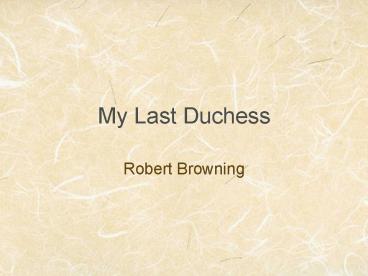My Last Duchess PowerPoint PPT Presentation
1 / 36
Title: My Last Duchess
1
My Last Duchess
- Robert Browning
2
My Last Duchess
3
What is the poem about?
- The Duke is talking about his dead wife
- the Duchess.
The starting point is her portrait on the wall
4
The poem is about how the Duke was made angry by
some of the things his wife did.
She died. after his commands were given
Her portrait now hangs on the wall.
5
The poem is a Dramatic Monologue.
This means the poem is written in the voice of
a character rather than the voice of the poet.
The character who is speaking is
6
The Duke of Ferrara
And he is speaking to his visitor
The counts Envoy.
7
The counts envoy has been sent to discuss a
dowry, as the Duke is looking for a new wife
the next duchess.
While they are talking the conversation
turns To the portrait of the Dukes dead wife
8
That's my last Duchess painted on the wall,
Looking as if she were alive.
9
(No Transcript)
10
The picture is kept hidden
11
Behind a curtain
- Where the Duke can enjoy it by himself
12
looking as if she were alive.
This suggests that in painting the portrait the
painter did an excellent job.
Its also ironic when we learn more about her
death.
13
Frà Pandolf's hands worked busily a day,
Frà Pandolf was the painter of the portrait.
14
When the Duke draws back the curtain the
envoy sees in the Duchessexpression The depth
and passion of its earnest glance,
15
We can see from the line below that the Counts
envoy has asked how the glance or spot of
joy came to be there.
so, not the first are you to turn and ask thus.
16
The Duke explains what happened
Sir, 'twas not Her husband's presence
only, called that spot Of joy into the
Duchess' cheek
It wasnt just me, her husband, who brought
pleasure to her face.
17
Perhaps Fra Pandolf had paid her a compliment
when painting the picture?
.. Paint Must never hope
to reproduce the faint Half-flush that
dies along her throat"
18
She probably thought the painter was being
courteous.
But she wastoo easily impressed And her looks
went everywhere
19
Sir, 'twas all one!
Everything was the same to her- of equal
importance.
My favour at her breast.
20
Other things that were on equal importance were
A sunset.
21
The bough of cherries
22
the white mule she rode with round the terrace
23
These things were all the same to her.
all and each Would draw
from her alike the approving speech, Or
blush, at least.
24
..Even had you skill
In speech -- (which I have not) -- to make your
will Quite clear to such an one, and say,
"Just this Or that in you disgusts me
here you miss, Or there exceed the mark"
-- and if she let Herself be lessoned so,
nor plainly set
Her wits to yours, forsooth, and made excuse,
--E'en then would be some stooping, and I
choose Never to stoop. Oh sir, she
smiled, no doubt,
25
She thanked men, -- good! but thanked
Somehow -- I know not how -- as if she ranked
My gift of a nine-hundred-years-old name
With anybody's gift.
What do the dashes in the middle of the lines
suggest?
26
My gift of a nine-hundred-years-old name
What does this tell you about how the Duke Feels
about his name?
27
The Duke considers telling his wife how she has
offended him but this is difficult even if you
were skilled with words.
..Even had you skill In speech --
(which I have not) --
28
But to tell her here you disgust me
or
exceed the mark.
involves stooping and I choose never to
stoop.
29
Oh sir, she smiled,
no doubt, Whene'er I passed her but who
passed without Much the same smile?
30
.I gave commands Then all
smiles stopped together. There she stands
As if alive.
31
Will't please you rise?
32
The Count your master's known munificence
Is ample warrant that no just pretence Of
mine for dowry will be disallowed
33
Though his fair daughter's self, as I avowed
At starting, is my object.
34
Notice Neptune, though, Taming a
sea-horse, thought a rarity, Which Claus
of Innsbruck cast in bronze for me!
35
The mad duke...cannot love without so
possessing and destroying the identity of his
wife that he literally kills her and lives with
her dead substitute, a work of art."
Isobel Armstrong
36
(No Transcript)

